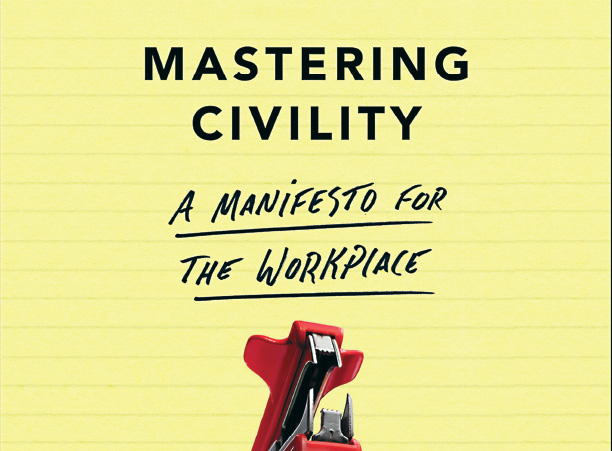
The In Your Own Words alumni essay appears in each issue of Holy Cross Magazine. Porath wrote the essay for the Spring 2017 issue based on research for her book, "Mastering Civility: A Manifesto for the Workplace," which was included on The Washington Post's list of "10 books on leadership to read in 2017."
The summer after I graduated from Holy Cross, I thought I landed my dream job: helping launch a sports academy. However, I quickly learned that this workplace was rife with rudeness. The actions of a narcissistic, dictatorial boss trickled down through the ranks. He belittled employees, demeaned managers in front of others and barked orders at subordinates. Employees felt disconnected and disengaged. Some intentionally sabotaged the organization; many took out their frustrations on others, disparaging colleagues, making snide remarks to customers and failing to pitch in like good teammates do. This experience led me to study the costs of incivility — defined as any rude, disrespectful or insensitive behavior. My goal was to help organizations build more positive cultures.
The Cost of Incivility
Over the past 20 years, I’ve researched the experiences of tens of thousands of people, across six continents and in nearly every industry and type of organization. I’ve learned that our interactions with people — even our non-verbals — impact others more than we might think. You lift people up by showing people respect: making them feel valued, appreciated and heard. Uncivil behaviors — which vary widely and include ignoring, demeaning or undermining others — hold people down. Incivility is extremely costly to people and organizations.
In a poll of 800 managers and employees across 17 industries that I conducted with Christine Pearson of the Thunderbird School of Global Management, we found that when employees don’t feel respected, they perform worse. About half intentionally decrease the time spent at work, 38 percent said that they deliberately decreased the quality of their work and 66 percent acknowledged that their performance declined. Twenty-five percent admitted to taking their frustration out on customers. Eighty percent lost work time worrying about the incident, and 63 percent lost work time in their effort to avoid the offender. Twelve percent said they had left their job because of the uncivil treatment.
Separate experiments conducted with Amir Erez of the Warrington College of Business at the University of Florida reveal that incivility exacts a deeper toll because of the subtle ways it affects people’s thinking skills and helpfulness. In one study, in which an experimenter belittled the peer group the participants belonged to, participants performed 33 percent worse on anagram word puzzles and came up with 39 percent fewer creative ideas during a brainstorming task focused on how they might use a brick.
In our second experiment, a stranger (a “busy professor,” encountered en route to the experiment) was rude to participants by admonishing them for bothering him. Participants’ performance was 61 percent worse on word puzzles, and they produced 58 percent fewer ideas in the brick task compared to those who had not been treated rudely. In these studies, people were also nearly three times less likely to help the experimenter pick up something that had been intentionally dropped. In subsequent experiments with Erez, I found the same pattern for those who merely witnessed incivility.
Harm in a Hostile Work Environment
Even if people want to perform at their best, they can’t in a hostile work environment. Incivility hijacks focus, decreasing creativity and performance. Just being around incivility shatters focus, stifles success and squashes helpfulness. It shuts people down. People stop speaking up, sharing ideas and discussing issues.
Civility pays. In a social network study of a research and development department of a biotechnology firm, Alexandra Gerbasi at the University of Surrey, Sebastian Schorch at the Universidad de los Andes and I found that people who perceived a colleague as civil — defined as treating someone respectfully, with dignity, politeness or pleasantry — would be more likely to seek that person out for work advice and were twice as likely to see that person as a leader. Those seen as civil performed 13 percent better as rated annually by their manager. By being civil, leaders create a positive cycle in their organization.
In another study in which I surveyed over 20,000 employees across industries, those who felt their leader “demonstrated respect” reported 56 percent better health and well-being, 92 percent greater focus and prioritization, 26 percent more meaning and significance and 55 percent more engagement. In fact, no other leader behavior had a bigger effect on employees across the outcomes measured. Being treated with respect was more important to employees than recognition and appreciation, communicating an inspiring vision, providing useful feedback — even opportunities for learning, growth and development.
Mastering Civility
Little actions you take make work better. Small actions, such as listening attentively, humbly asking questions, acknowledging others, thanking people and sharing credit can give you a performance boost. Yet, when you’re busy or feeling stressed, it’s easy to forget pleasantries, lose sight of our tone, speak brusquely, fail to smile or acknowledge others and ignore other niceties when interacting with your employees, team or others. Becoming more mindful of your interactions and more aware of how you’re perceived are key to mastering civility.
In every interaction, you have a choice. Do you want to lift people up or hold them down? Who do you want to be?
Take a "Civility Quiz" to assess assess how civil you are towards coworkers, and learn what you can do to improve.
Written by Christine Porath '95 for the Spring 2017 issue of Holy Cross Magazine.
About Holy Cross Magazine
Holy Cross Magazine (HCM) is the quarterly alumni publication of the College of the Holy Cross. The award-winning publication is mailed to alumni and friends of the College and includes intriguing profiles, make-you-think features, alumni news, exclusive photos and more. Visit magazine.holycross.edu/about to contact HCM, submit alumni class notes, milestones, or letters to the editor.